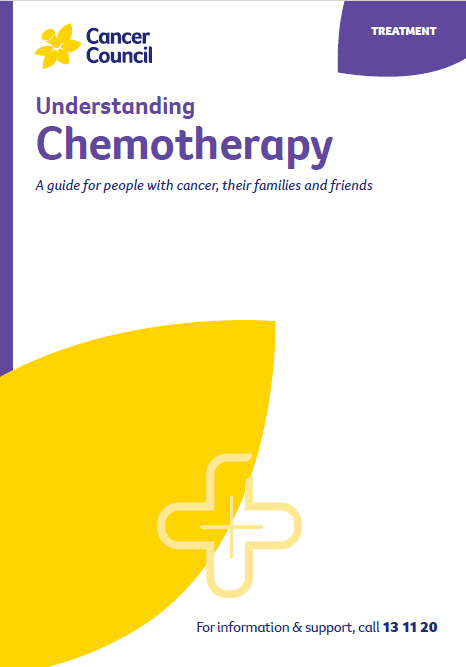- Home
- Pancreatic cancer
- Treatment to manage cancer and symptoms
- Chemotherapy
Chemotherapy
Chemotherapy uses drugs to kill or slow the growth of cancer cells. It is used for pancreatic cancer at various stages.
Learn more about:
- Overview
- How chemotherapy is given
- Side effects of chemotherapy
- Video: Chemotherapy for pancreatic cancer
Overview
If the cancer is at a stage where it can be removed with surgery, chemotherapy is often used before or after the surgery.
When surgery cannot remove the cancer, chemotherapy can be used as a palliative treatment to slow the growth of the cancer and relieve symptoms. For some stage 3 cancers, chemotherapy may be combined with radiation therapy. This is called chemoradiation.
How chemotherapy is given
The chemotherapy drugs are usually given as a liquid through a drip inserted into a vein in the arm (intravenous infusion) or as tablets that you swallow. To avoid damaging the veins in your arm, it may also be given through a tube implanted into a vein (called a port, catheter, central line or PICC line). This will stay in place until all your chemotherapy treatment is over.
You will usually receive treatment as an outpatient (not admitted to hospital). Typically, you will have several courses of treatment, with rest periods of a few weeks in between. Your medical oncologist will assess how the treatment is working based on your symptoms and wellbeing, as well as scans and blood tests. Tell your team about any prescription, over-the-counter or natural medicines you are taking, as these may affect how the chemotherapy works in your body.
Side effects of chemotherapy
Chemotherapy can affect healthy cells in the body, which may cause side effects. Some people have few side effects, while others have many. The side effects will depend on the drugs used and the dose. Your medical oncologist and chemotherapy nurses will explain the possible side effects to you, the best ways to manage them and who to contact if you need support.
Side effects of chemotherapy may include:
- feeling very tired (fatigue)
- feeling sick (nausea)
- vomiting
- mouth ulcers and skin rashes
- hair loss
- diarrhoea or constipation
- flu-like symptoms such as fever, headache and muscle soreness
- poor appetite.
Chemotherapy can also affect the number of cells in your blood. Fewer white blood cells can mean you are more likely to catch infections. Fewer red blood cells (anaemia) can leave you weak and breathless.
Most chemotherapy side effects are temporary and can be managed, so discuss how you are feeling with your treatment team. If you are having chemotherapy as a palliative treatment, your treatment team will help you weigh up the benefits of improving your cancer symptoms against any side effects the chemotherapy is causing.
For more on this, see our general section on Chemotherapy.
Many people with pancreatic cancer experience fatigue. This is different to normal tiredness as it doesn’t always go away with rest or sleep. The fatigue may be a side effect of treatment or caused by the cancer itself. Managing fatigue is an important part of cancer care. For more on this, see Fatigue and cancer or listen to our podcast on Managing Cancer Fatigue below.
→ READ MORE: Radiation therapy for pancreatic cancer
I found chemo a bit daunting – walking into the room with the chairs lined up. But the nurses were great and talked through it with me so I knew what to expect.
Cheryl
Video: Chemotherapy for pancreatic cancer
Watch this video to learn how chemotherapy is used to treat pancreatic cancer and hear stories from people who have had the treatment.
Podcast: Managing Cancer Fatigue
Listen to more of our podcast for people affected by cancer
Prof Lorraine Chantrill, Honorary Clinical Professor, University of Wollongong, and Head of Department, Medical Oncology, Illawarra Shoalhaven Local Health District, NSW; Karen Baker, Consumer; Michelle Denham, 13 11 20 Consultant, Cancer Council WA; Prof Anthony J Gill, Surgical Pathologist, Royal North Shore Hospital and The University of Sydney, NSW; A/Prof Koroush Haghighi, Liver, Pancreas and Upper Gastrointestinal Surgeon, Prince of Wales and St Vincent’s Hospitals, NSW; Dr Meredith Johnston, Radiation Oncologist, Liverpool and Campbelltown Hospitals, NSW; Dr Brett Knowles, Hepato-Pancreato-Biliary and General Surgeon, Royal Melbourne Hospital, Peter MacCallum Cancer Centre, and St Vincent’s Hospital, VIC; Rachael Mackie, Upper GI – Clinical Nurse Consultant, Peter MacCallum Cancer Centre, VIC; Prof Jennifer Philip, Chair of Palliative Care, University of Melbourne, and Palliative Medicine Physician, St Vincent’s Hospital, Peter MacCallum Cancer Centre and Royal Melbourne Hospital, VIC; Lucy Pollerd, Social Worker, Peter MacCallum Cancer Centre, VIC; Rose Rocca, Senior Clinical Dietitian – Upper GI, Peter MacCallum Cancer Centre, VIC; Stefanie Simnadis, Clinical Dietitian, St John of God Subiaco Hospital, WA.
View the Cancer Council NSW editorial policy.
View all publications or call 13 11 20 for free printed copies.
